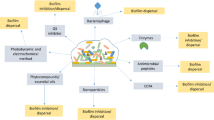Abstract
This paper is a tribute to the scientific accomplishments of Ernst Chain and the influence he exerted over the fields of industrial microbiology and biotechnology. Chain is the father of the modern antibiotic era and all the benefits that these therapeutic agents have brought, i.e., longer life spans, greater levels of public health, widespread modern surgery, and control of debilitating infectious diseases, including tuberculosis, gonorrhea, syphilis, etc. Penicillin was the first antibiotic to become commercially available, and its use ushered in the age of antibiotics. The discovery of penicillin’s bactericidal action had been made by Alexander Fleming in London in 1928. After publishing his observations in 1929, no further progress was made until the work was picked up in 1939 by scientists at Oxford University. The group was headed by Howard Florey, and Chain was the group’s lead scientist. Chain was born and educated in Germany, and he fled in 1933 as a Jewish refugee from Nazism to England. Other important members of the Oxford research team were Norman Heatley and Edward Abraham. The team was able to produce and isolate penicillin under conditions of scarce resources and many technical challenges. Sufficient material was collected and tested on mice to successfully demonstrate penicillin’s bactericidal action on pathogens, while being nontoxic to mammals. Chain directed the microbiological methods for producing penicillin and the chemical engineering methods to extract the material. This technology was transferred to US government facilities in 1941 for commercial production of penicillin, becoming an important element in the Allied war effort. In 1945, the Nobel Prize for medicine was shared by Fleming, Florey, and Chain in recognition of their work in developing penicillin as a therapeutic agent. After World War II, Chain tried to persuade the British government to fund a new national antibiotic industry with both research and production facilities. As resources were scarce in postwar Britain, the British government declined the project. Chain then took a post in 1948 at Rome’s Instituto Superiore di Sanitá, establishing a new biochemistry department with a pilot plant. During that period, his department developed important new antibiotics (including the first semisynthetic antibiotics) as well as improved technological processes to produce a wide variety of important microbial metabolites that are still in wide use today. Chain was also responsible for helping several countries to start up a modern penicillin industry following World War II, including the Soviet Union and the People’s Republic of China. In 1964, Chain returned to England to establish a new biochemistry department and industrial scale fermentation pilot plant at Imperial College in London. Imperial College became the preeminent biochemical department in Europe. Chain was also a pioneer in changing the relationship between government, private universities, and private industry for collaboration and funding to support medical research. Ernst Chain has left a lasting impact as a great scientist and internationalist.
Similar content being viewed by others
References
Bowden ME, Crow AB, Sullivan T (2010) Howard Walter Florey and Ernst Boris Chain. Chemical Heritage Foundation Website, www.chemiheritage.org. Accessed 15 May 2013
Clark RW (1985) The life of Ernst Chain: penicillin and beyond. St. Martin’s Press, New York
Conniff R (2012) Penicillin, wonder drug of WWII. Mil Hist 30(2):38–43
Fleming A (1929) On the antibacterial action of a Penicillium, with special reference to their use in the isolation of B. influenzae. B J Exp Pathol 19:226–236
Kardos N, Demain AL (2011) Penicillin, the medicine with the greatest impact on therapeutic outcomes. Appl Microbiol Biotechnol 92:677–687
Li JJ (2006) Laughing gas, Viagra and Lipitor, the human stories behind the drugs we use. Oxford University Press, Oxford
Macfarlane G (1984) Alexander Fleming—the man and the myth. Hogarth Press, London
Murfett M (2012) Penicillin: the quiet cultivator. Hist Today 62(9)
Ratcliff JD (1945) Yellow Magic—the story of penicillin. Random House, New York
Sacks (Chief Rabbi Lord Jonathan Sacks of Great Britain) (2012) The Importance of asking questions in Judaism. Israel National News
Acknowledgments
A considerable portion of this review derives from statements made directly by Professor Ernst Chain to one of the authors (NK) who was a graduate student under Professor Chain at Imperial College, London in 1973–1974. Additional material is derived from an interview between NK and Ernst Chain’s son, Dr. Daniel Chain, on September 11, 2012 in New York City.
Author information
Authors and Affiliations
Corresponding author
Rights and permissions
About this article
Cite this article
Kardos, N., Demain, A.L. Ernst Chain: a great man of science. Appl Microbiol Biotechnol 97, 6613–6622 (2013). https://doi.org/10.1007/s00253-013-5017-4
Received:
Revised:
Accepted:
Published:
Issue Date:
DOI: https://doi.org/10.1007/s00253-013-5017-4




